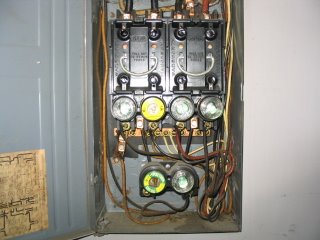 Aluminum wiring was commonly used from the late 1960’s until about 1978. It was introduced because it was less expensive than copper. It was not recognized until after installation that aluminum expands more than copper. This leads to the wire trying to move out from under the terminal screws. This is known as terminal creep. Also, because aluminum wire is softer than copper, electricians could easily nick the wire resulting in smaller wire diameter. The result of such nicking is localized hot spots. These hot spots reduce the ability of the wire to carry electricity safely. Lastly, the oxide that forms on aluminum wire is a poor conductor of electricity. This leads to higher resistance and temperature. Due to the problems associated with aluminum wiring, special components, designated Cu-Al were produced. These included electrical circuits, wire connectors, stove breaks, etc. Electrical receptacles were designed with the designation CO/ALR.
Aluminum wiring was commonly used from the late 1960’s until about 1978. It was introduced because it was less expensive than copper. It was not recognized until after installation that aluminum expands more than copper. This leads to the wire trying to move out from under the terminal screws. This is known as terminal creep. Also, because aluminum wire is softer than copper, electricians could easily nick the wire resulting in smaller wire diameter. The result of such nicking is localized hot spots. These hot spots reduce the ability of the wire to carry electricity safely. Lastly, the oxide that forms on aluminum wire is a poor conductor of electricity. This leads to higher resistance and temperature. Due to the problems associated with aluminum wiring, special components, designated Cu-Al were produced. These included electrical circuits, wire connectors, stove breaks, etc. Electrical receptacles were designed with the designation CO/ALR.Another way some electricians have solved the aluminum issue was to use special connectors to join the aluminum wires to short “pig tails” of copper wire just before they connect to outlets. This is not recommended for two reasons. First, every connection added to an electrical system is another potential problem area. Second the addition of so many connections in an electrical panel can lead to overcrowding of the box.
As long as proper connections are used, and the connections are made without damaging the wire, aluminum wire is considered to be safe. It is permitted for use by many electrical codes, although it is not commonly used in homes anymore due to the adverse publicity it received in its early days of service. Aluminum is still commonly used by utilities in street wiring and for service entrance cables.
This is why it is important to get a home inspection from a licensed home inspector that is knowledgeable about such wiring. Aluminum is safe as long as it is connected correctly. Your new home does not have to be rewired at a costly expense.
No comments:
Post a Comment